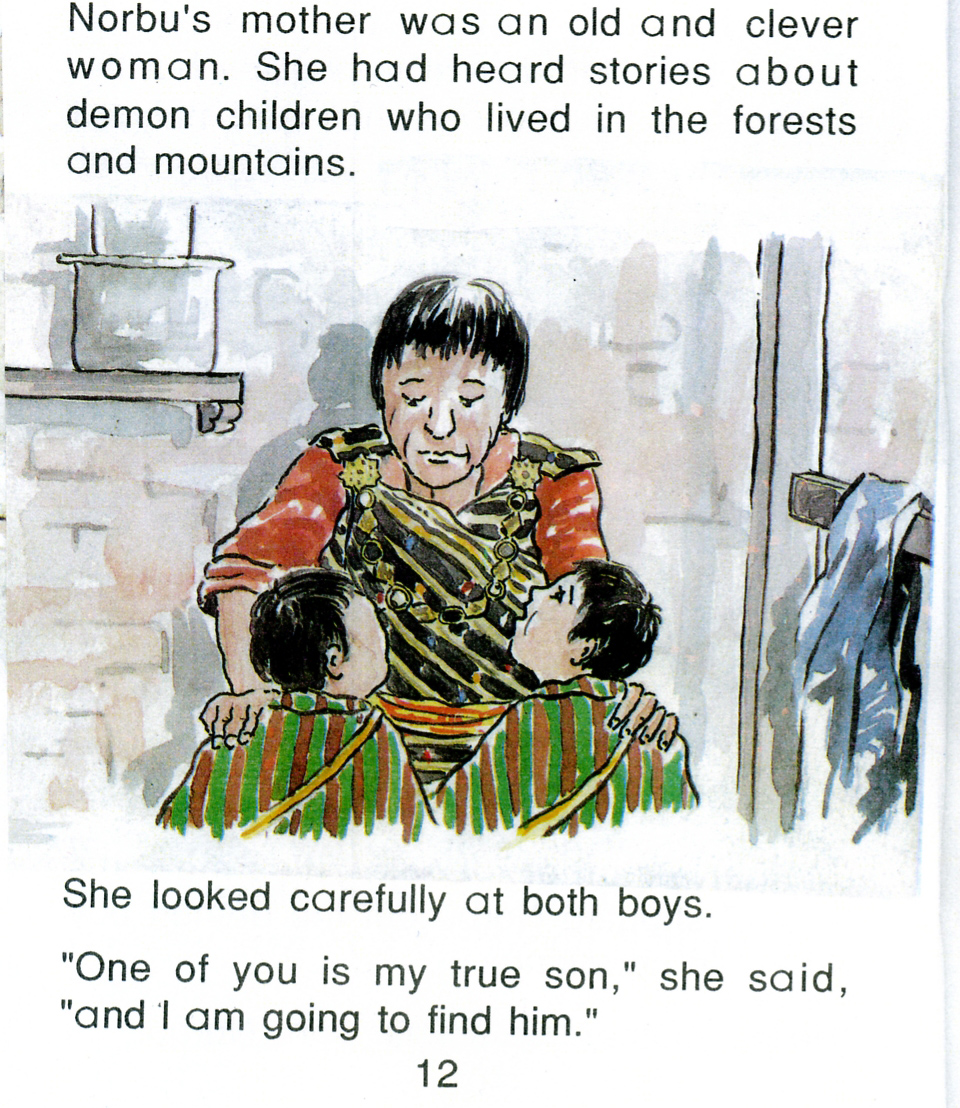|
|
| |
■
『世界の英語教室 (小学校)』
[ブータン編]
 New!
New!
| Hello from Bhutan! (ブータンからこんにちは!)
By Mina Hisada/Illustration by Puri |
|
ブータンは、GNP(国民総生産)より*GNH(グロース・ナショナル・ハッピネス) の充実を国家の方針として取り入れるなど、独自の路線を模索している。英語教育も然り。ブータン王国で近代化教育が始まったのは30年ほど前から。そして小学校で全教科を英語で教えだしたのは1980年代に入ってからだ。世界の言語教育の分野で今まさに注目されている「イマージョン教育」を、20年以上も前から実践していたことになる。なぜそのやり方が取り入れられたのか、どのようなプロセスがあったのか、今、ブータンの小学生はどのような教育を受けているのか。今回は、首都ティンプーに住む2人の小学生を通して、じっくり探ってみたい。
(Bhutan is fairly unique. It has a GNH rather than a GNP - that's Gross National Happiness instead of Gross National Product. Its approach to English language education is also unusual. Educational reform in Bhutan began about 30 years ago, and by the 1980s they started teaching all subjects in English. In other words, 20 years ago they had already adopted the immersion program that is the focus of so much debate around the world at this moment. Why did they start to doing this? We will explore this question with the help of two Bhutanese kids who live in the capital city, Thimphu.)
|
|
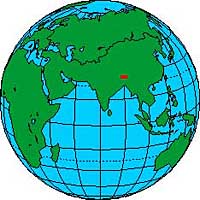
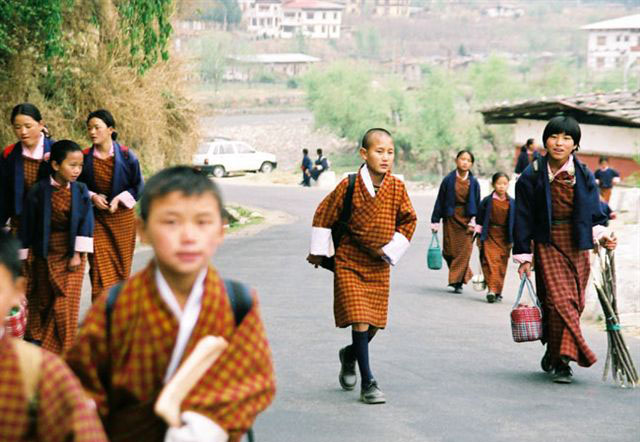
photo by Taku EGUSA
第6回目の今回は、
ブータンの小学生にスポットライトを
当てます。
|
|
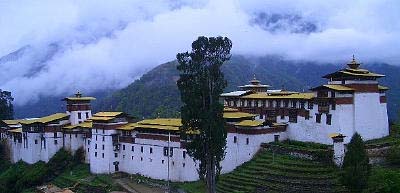
|
| Photos by Toshiaki KEICHO |
* グロース・ナショナル・ハッピネスとは、国の発展を「経済発展(GNP)」よりも、「国民がどれだけ精神的に満たされているか(GNH)」で計ろうというもの。このスローガンは今から遡ること約30年前、四代目ジクメ・シンゲ・ワンチュク現国王により唱えられた。それは、くしくも日本が経済成長を駆け上っていた1970年代のことであった。現在、この方針には、日本をはじめ多くの先進国が注目している。
(What is Gross National Happiness? This concept was first conceived by King Jigme Singye Wangchuck about 30 years ago when the Japanese economy was growing fast. GNH presupposes that you can analyze national growth not by GNP, but by how happy people feel. Many developed countries, such as Japan, are now paying heed.)
<ブータンひとくちメモ>
★ ブータンの正式名称は、ブータン王国(Kingdom of Bhutan)。面積は九州と同じぐらい。国民の70%が農業に関わっており、その国土の60-70%は森林です。人口約65-70万。言語はゾンカ語ですが、小学校から英語で教科を教えているため、英語も通じます。ブータンの人たちは、自分の国のことを"Druck Yuru" ドュルック・ユル(龍の国)と呼んでいます。
Druck は「竜」、Yuru は「国」を表します。例えば、ブータンの航空会社は Druck Air(ドュルック・エア)と呼ばれ、また英語の教科書の表紙には、必ず "Druck English Development Programme" と書いてあります。
(Bhutan's proper name is the Kingdom of Bhutan. It's about the same size as Kyushu. Sixty to seventy percent of the land is covered in forest. Seventy percent of the 65 to 75 million people living in Bhutan is involved in agriculture. Even though Dzongka is their mother tongue, English is spoken widely, because kids are educated in English. Bhutanese call their country as druck yuru, which means the country of the dragon. The word druck is also used in their English textbooks to mean dragon.)
★地方語ごとに言葉が違うといわれるブータンに国語(ゾンカ語)が定められたのは1980年代のこと。ゾンカの「ゾン」は「城」、「カ」は「言語」を表す。そのため、「ゾンカ語」ではなく、単に「ゾンカ」と表されることもある。ゾンカのほか、ブータンの地方言語、英語、ネパール語、ヒンディ語などが通じる。
(Dzongka has been the national language since 1980, although languages vary widely depending on where in Bhutan you're from. Let me explain a little bit about Dzongka. Dzong means castle, and ka means language. [NOTE: In Japanese, you might refer to the language as Dzongka-go, but that would end up meaning "Dzong language language" and sounds strange. Refer to it just as Dzonka.] Besides Dzongka, English, Nepalese and Hindi are commonly spoken in Bhutan.)
|
■PART 1
今日のお友達(1人目):ブータンのサンガイ・ラゾム・ティンレイちゃん(12歳)
(Today's friend is Sangay Lhazom Thinley, 12 years old.)
|
|
| |
|
|
| |
|
|
|
Photos by Taku EGUSA
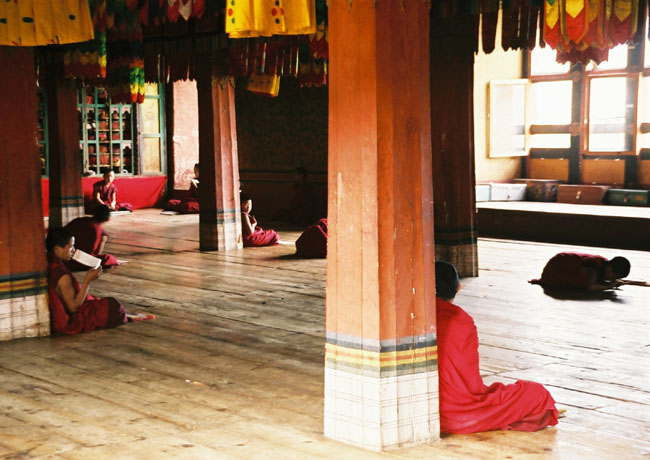 |
 |
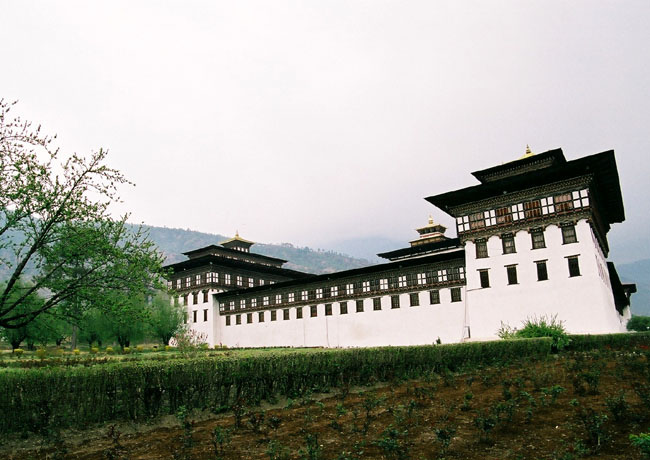 |
 |
(お祈りをする少年僧たち)
|
(プナカ・ゾン) |
(タシチョ・ゾン) |
(パロの市場) |
|
|
■PART 1
今日のお友達(2人目): ブータンのツェリン・ペムちゃん(11歳)
(Today's friend is Tshering Pem, 11 years old.)

 ツェリン・ペム。ゾンカ語で、ツェリンは「長生き」、ペムは「蓮の花(仏教のお花)」という意味です。
ツェリン・ペム。ゾンカ語で、ツェリンは「長生き」、ペムは「蓮の花(仏教のお花)」という意味です。
(My name is Tshring Pem.Tshring means longlife and Pem means lotus flower in dzongka.)
|

 インド人俳優のシャル−ク・カーンと女優のプリーティ・ジンカです。
インド人俳優のシャル−ク・カーンと女優のプリーティ・ジンカです。
(My hero is an Indian actor, "Sharukhan" and my heroine is an Indian actress "Preity Zinka".)
|

 肌が白くて、優しくてきれいな人たちだと思う。
肌が白くて、優しくてきれいな人たちだと思う。
(My impression of Japanese people is that they are white, kind and beautiful.)
|
|
| |

 両親
両親
(My treasure is parents.) |
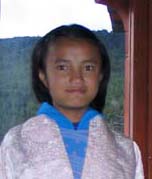 |

 お医者さんになること。
お医者さんになること。
(My dream is to become a doctor.) |
|
| |

 ピザ
ピザ
(My favorite food is pizza.)
|

 科学
科学
(My favorite subject is science.)
|


4歳の時から習い始めてるの。
(I started learning English when I was four years old.)
|
|
|
Photos by Taku EGUSA
 |
 |
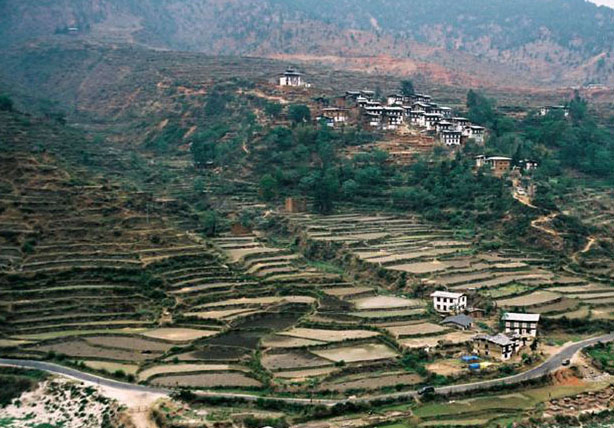 |
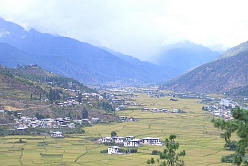 |
(タクツァン僧院-その1)
|
(タクツァン僧院-その2) |
(段々畑) |
(Paro Valley) |
|
|
■PART 2
公立の小学校に通うサンガイ・ラゾム・ティンレイちゃん
とツェリン・ペムちゃん 。
どんな学校生活を送っているのかな?
A typical week for Sangay Lhazom Thinley &
Tshring Pem (^o^)丿
|
● 朝礼では、文殊菩薩にお祈りを捧げます。
それから、国旗を掲げ、国歌斉唱します。
(At morning assembly, we pray to Manjusri Bodhisattva. After that we fly the national flag and sing the national anthem.)
● ゾンカ語のクラス以外は、英語で授業を受けます。
(All subjects — except for dzongka — are taught in English.)
●学校によっては、EVSと呼ばれる「環境学」の授業があります。身の回りの汚染された川を調査したりして地域に貢献します。
(Some schools have a subject called EVS (Environmental Studies). We do research about things like rivers and forests near our village and contribute our findings to the local community.)
|
|
■PART 3-- その1
ブータンの子どもはどうやって英語を勉強しているの?
(How do Bhutanese kids master English?)
これは、小学校の教科書です。ブータンの昔話や、日常生活に基づいた話が多く、
詩もあります。中には日本の俳句も含まれています。ご協力下さった石田孝夫先生ありがとうございました。
(^o^)丿
(Here are some text books used by elementary school students, courtesy of Mr.Ishida Takao.
There are a lot of Bhutanese folk stories and poems - and also several Japanese poems!)
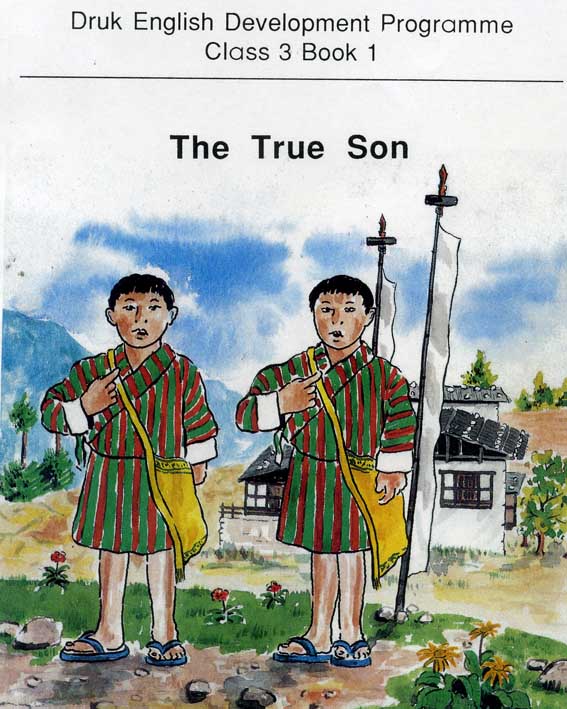 (教科書のカバー)
(教科書のカバー)
|
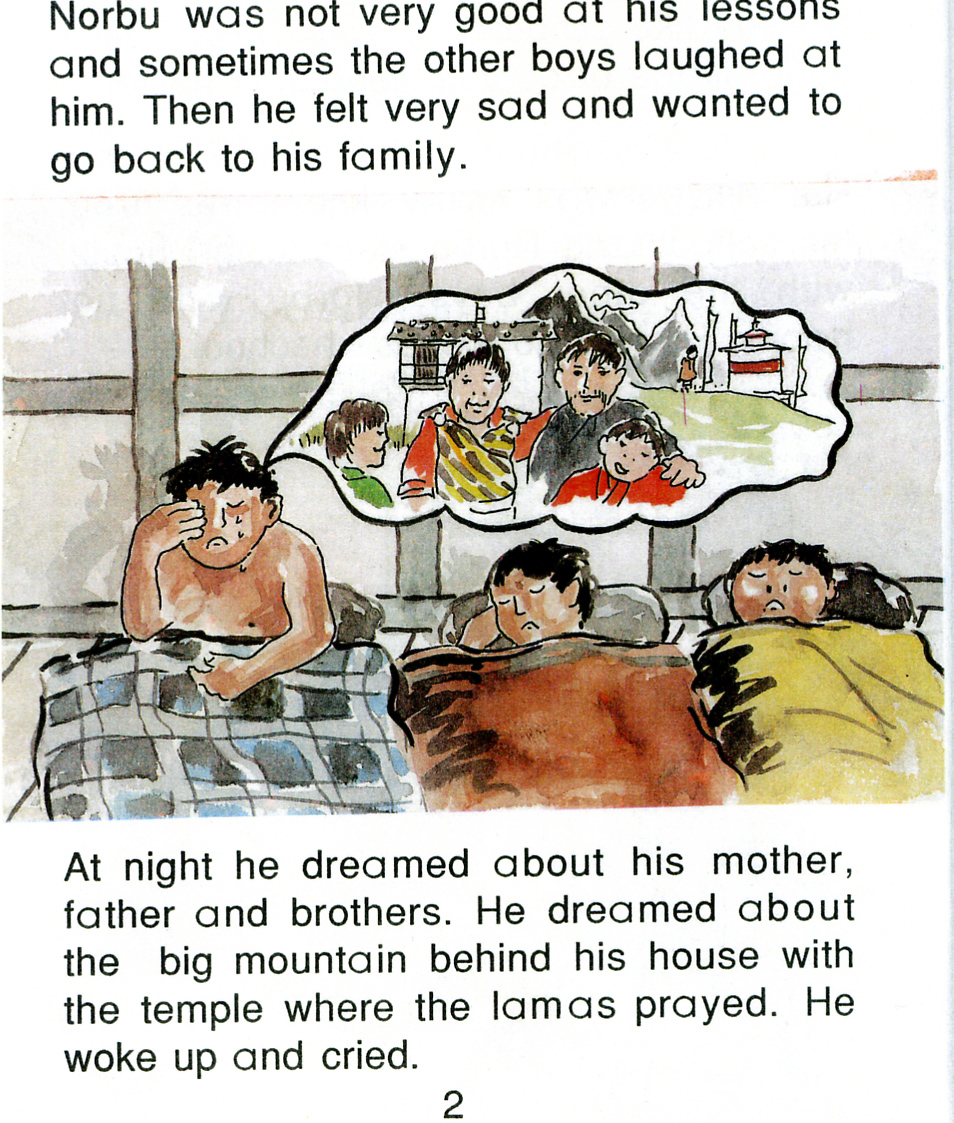
(寮生活をしている男の子は、ホームシックになってしまいます・・)
|
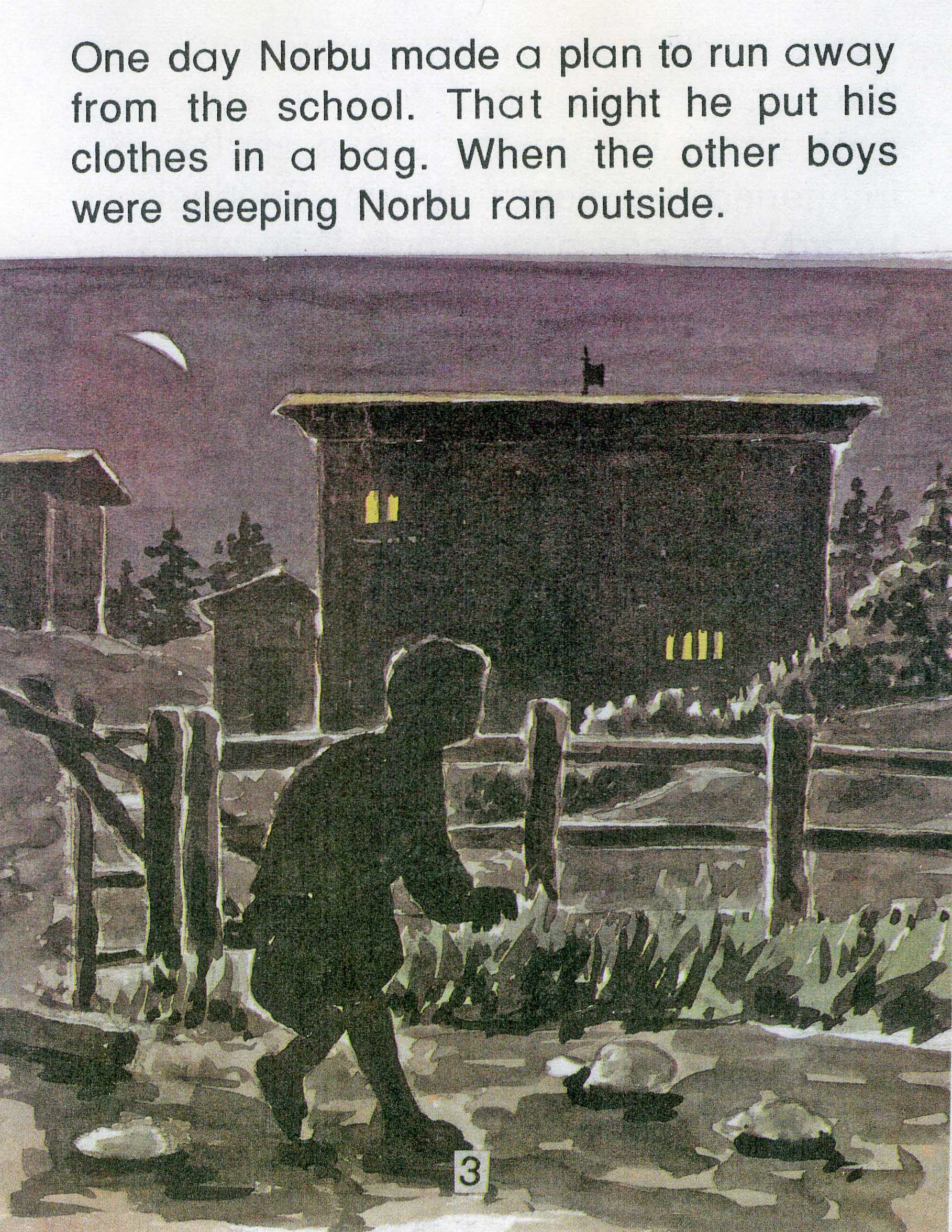 (ある晩、こっそり抜け出します。 )
(ある晩、こっそり抜け出します。 )
|
■PART3 — その2
ブータン英語の特徴(Characteristic of Bhutanese English)
ブータン人が話す英語は、どのような特徴があるのでしょうか。
(What are the characteristics of Bhutanese English?)
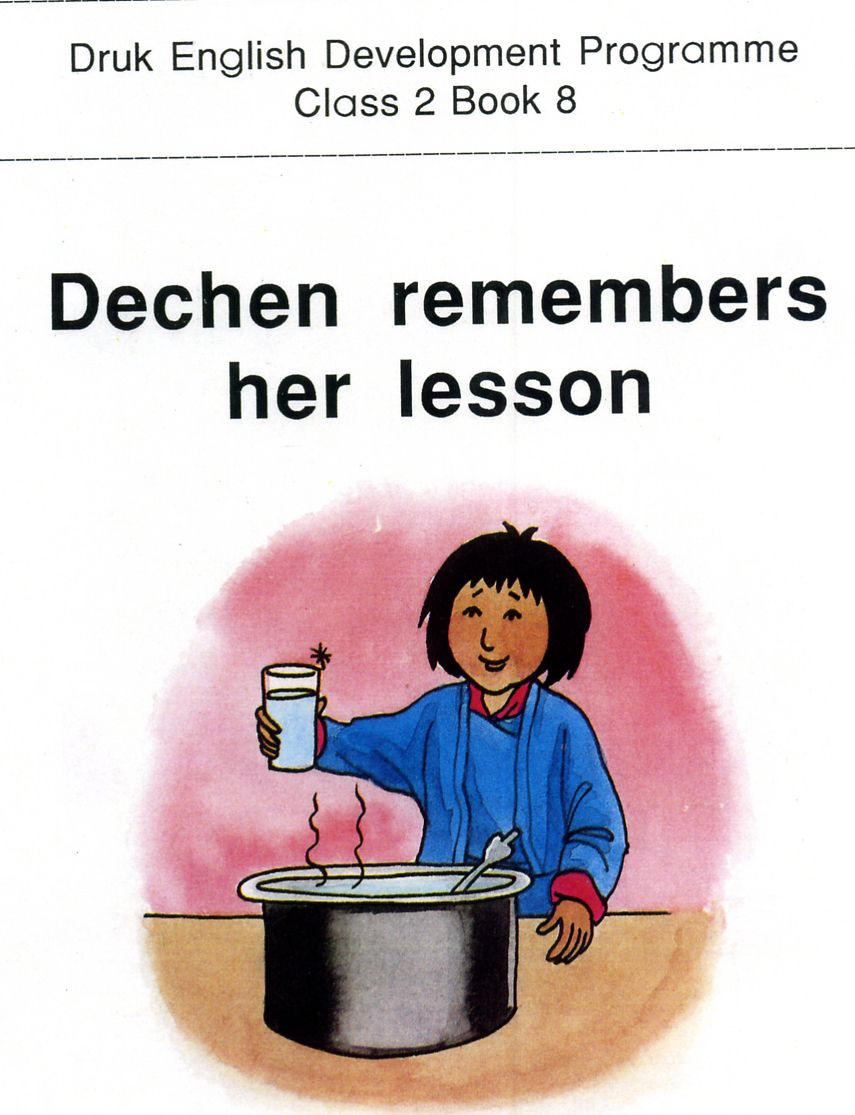 (教科書のカバーその2)
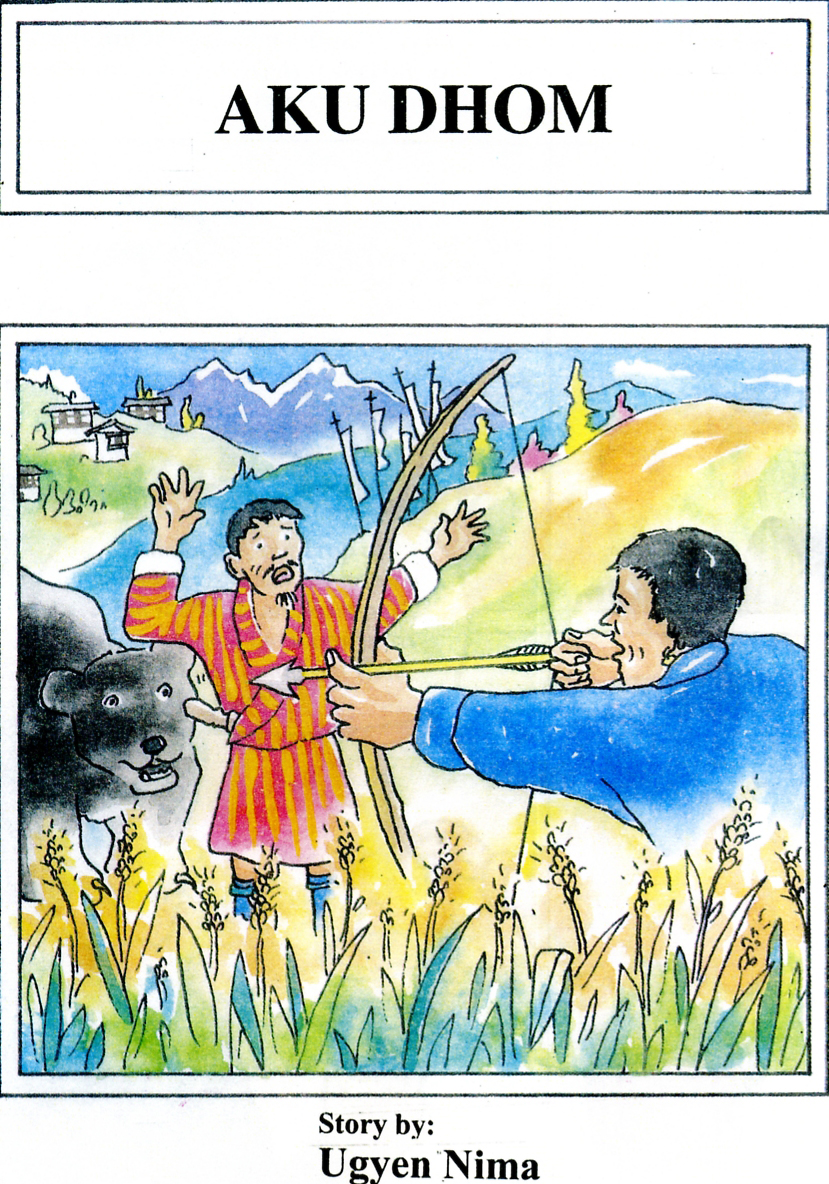 (教科書のカバーその3)
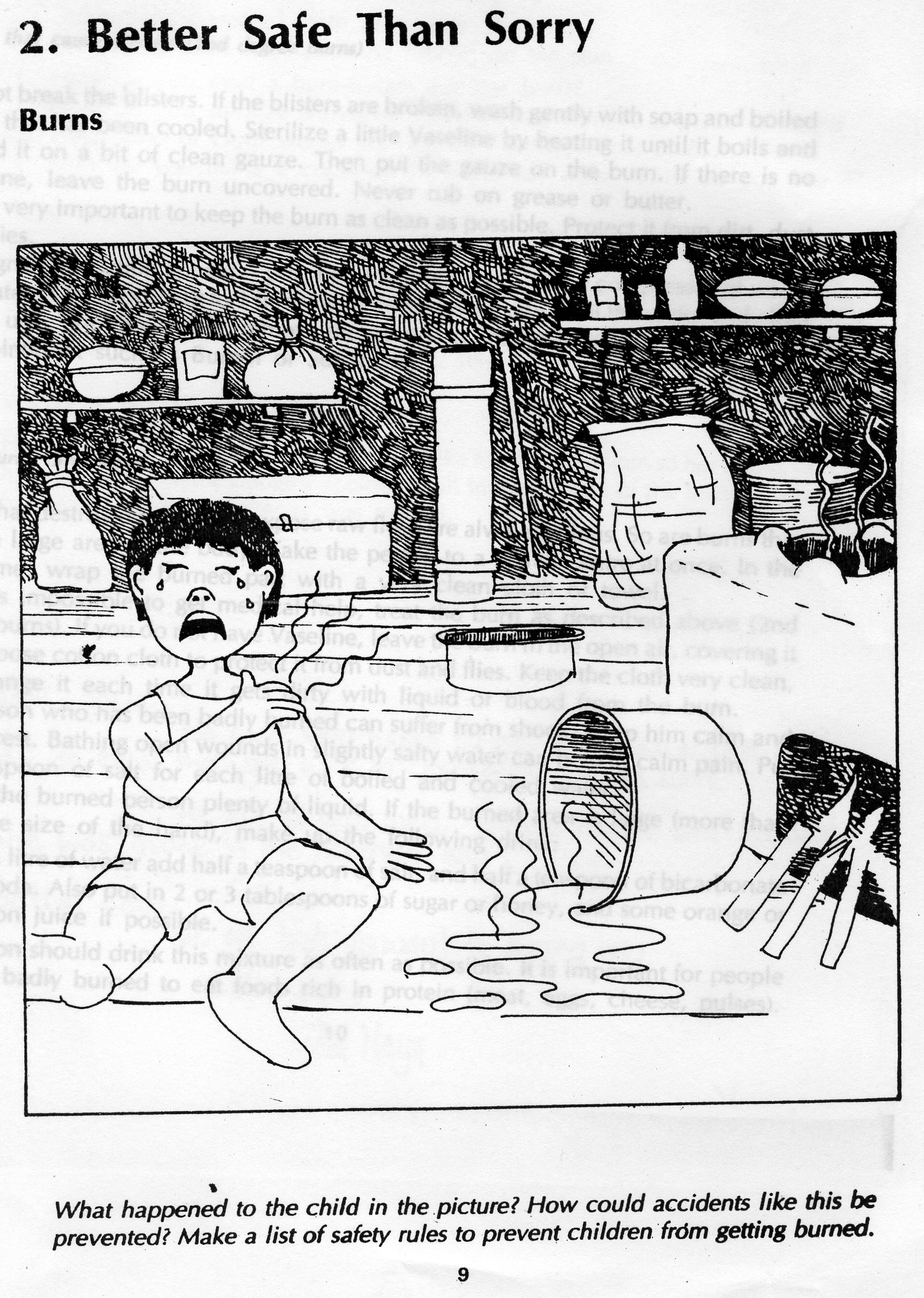 (教科書の中身-"やけどの対処法"について)
| |
★
特徴1(Characteristic 1)
☆口をあまり開けず、発音がクリアーではない傾向がある。
(They tend not to open their mouths very much when they speak.)
※ブータンの言葉、ゾンカ語は濁音が多い。
(Example: There are a lot of voiced consonants in dzongka.)
Example (例)
ガ デ ベ ド など。
(example, ga, de, be, do)
ga de (ガデ)= what
ga (ガ )= who
ga chi ガチ= what
ga de be (ガデべ) = how
dari (ダリ)= today
naba (ナバ)= tomorrow
★特徴2(Characteristic 2)
☆話し言葉の後に「Mo(モ)?」をつける。
(Putting mo at the end of a sentence.)
Example: (例) Are you hungry, mo?
1)「Mo(モ)?」=ゾンカ語で「でしょう?」「〜だよね?」という言葉。
(Mo means "Isn't it?" in dzongka.)
2)「Mo(モ)?」=ゾンカ語で疑問を表す言葉ともなる。
(If you add mo to the end of a sentence, it turns it into a question.)
★特徴3(Characteristic 3)
☆ 言葉の最後に「La(ラ)」をつける。
(Putting la at the end of a sentence.)
Laはゾンカ語で目上の人に対する尊敬の意を表す。
(Adding la is a sign of respect toward people who are older.)
|
|
■PART 4
ブータンの公立の小学校についての基本データ
(General Information on Public Elementary School in Bhutan)
★クラスの人数
(How many students are there in a class?) |
約30人
(About thirty) |
★英語は何歳からはじめるの?
(When do you start learning English?) |
6歳
(Six years old)
|
★政府は小学校での英語教育を奨励している?
(Is English education encouraged from an early age?) |
している。(Yes.)
|
★それで、小学校での英語の授業は週何時間あるの?
(On average, how many hours each week do elementary school students study English?)
|
5−7時間
(five-seven hours)
|
★ブータンでは、みんな英語教育に興味はあるの?
(Are most people in Bhutan interested in English?) |
かなりある。
(Quite high. )
|
★英語の塾はあるの?
(Are there many English cram schools in Bhutan?) |
ある。
(Yes.)
|
★英語の先生はネイティブ?
(Are the English teachers native speakers?) |
ブータン人
(No, they are Bhutanese.)
|
★外国人の生徒や移民はいるの?
(Are there foreign students? If so, where are they from?) |
いる。インド人やネパール人など。
(Yes, they are from India or Nepal.)
|
★日本の小学校でも英語が必須科目になるかもしれないの。どう思う?
('English' might be a compulsory subject at elementary school Japan. What do you think about it?) |
いいと思う。
(Good idea.)
母国語が重要視される必要はあるけれど、英語は教育の媒体としてとらえるべきだと思う。
(I think it's a good idea. It's true that importance should be given to our own language but English should be used as a medium of instruction.)
|
★識字率を教えて!
(What is Bhutanese literacy rate?) |
56%
(It's 56%)
|
|
|
■PART 5
人々の声
Vox populi
 小学生の子供を持つブータン人の意見とは?
小学生の子供を持つブータン人の意見とは?
★
このサイトに登場してくれた、ペムちゃんのお父さん。ティンプーのサラリーマンです。
(Tshering Pem's father works at a company in Thimphu. Let's hear his opinion.)
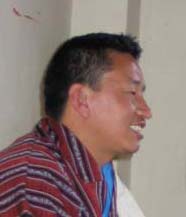
|
<ブータン人と語学について>
(About Bhutanese and English)
現在、世界においてコミュニケーションの媒介は英語になったともいえると思います。なので、早いうちから、学校で英語を教えることはとても有意義なことだと思います。世界を見渡してみるに、ほかの国の存在なしに、一国だけでやっていける国はないでしょう。お互い助け合い、支えあうためにもコミュニケーションの媒体である英語は、平和や繁栄や調和を作り出すもとにもなると思います。
( In today's world, English has become the medium of communication. It is very convenient, if we introduce English in schools from an early age. Today, a country cannot stand on its won feet alone if it does not have the cooperation of other countries. English plays an important role in the development of relations with other countries - leading to peace, prosperity and harmony among nations.
)
一方で、自国語も同じぐらい大切にする必要があると思います。自国語は、独立した国としての私たちのアイデンティティーの一部だからです。自分の国の言葉で意思表現ができないのは、本当に悲しいことだと思います。だから、英語と自国語は絶対に両方一緒に教えていくべきだと考えています。
(On other hand, we also have to give equal importance to our own national language - as it is part of our identity as an independent country. If people cannot express what they want to express in their own national language, that would be very sad. Therefore, I strongly encourage that English and the national language be taught side by side.)
|
|
 ブータン在住の日本人の意見とは?
ブータン在住の日本人の意見とは?
★ ブータン在住の青木薫さん。ブータン人と結婚し、現地で旅行会社をご主人と営んでいます。7年間のブータン暮らしからみえてきたこととは?
(Ms.Kaoru Aoki lives in Bhutan. She married a Bhutanese man and is running a travel agency with her husband. What does she think of life in Bhutan, after living there for seven years? )

|
<英語で教育を受けているブータンの子供をみてどう思いますか?>
(What do you think about Bhutanese kids who are educated in English?)
かわいそうだと思う。どうしてよその国の言葉で自分の国のおとぎ話を聞かなくてはいけないのか? どうして自分の国の歴史を英語で学ばなくてはいけないのか? そもそも教師が足りなかったから、教科書を作るだけの力が政府になかったから、今だに(特に中高等教育の理数系教師が)足りないからに他ならない。それは、国民にとって運の悪いことなのだ。ゾンカ語で「愛してます」とか「好きです」といったら、本気にしてもらえない、ふざけていると思われるとうちの甥たちは言う。彼らがガールフレンドに書く手紙はみんな英語。それは大変不幸なことだ。ゾンカ語でロックンロールやヒップポップができないなんて淋しいことだ。母語は人間のアイデンティティーの根幹になると私は信じている。この状況を自分達にとって不幸なことだと感じないブータン人のことも、心から気の毒に思う。
(I feel sorry for them. Why do they have to learn their own country's folk tales in a foreign language? Why do they have to learn about their own history in English even though they have their own language?
The reason could be a lack of teachers and the government doesn't seem to have the facilities to publish its own textbooks. Even now, they lack teachers, especially math and science teacher. It's a shame, really. My nephew tells me that if a guy said "I love you" in Bhutanese, then she wouldn't take him seriously. He should write to her in English. I think that's sad. Why can't they have rap or hip hop music in dzongka? Your own language should be part of you. It should be at the core of who you are. At least, I believe so. For those Bhutanese who don't feel any shame at the decline of their own language, I feel sorry for them as well. From the bottom of my heart.)
ブータンには英語では表現できない、この風土なり、この仏教国なりの美しい言葉がたくさんあるのに、それがどんどん忘れられていっている。いそいで何とかしなくては本当にこの国の国語は滅びてしまう。英語はブータン人の精神構造や感受性さえも変化させていると思う。この7年の変化しか知らないが、特に若者の動作・身体言語は、その精神構造とともに確実に変わってしまった。ブータン人らしいしぐさをする若者も少なくなった。ゴーやキラを着たハリウッド俳優みたいで美しくない。伝統衣装はそれなりの動作をするから美しいのだ。
(As a country where the majority of the population are Buddhist, the language has developed in many ways to reflect the beauty of the people's beliefs and the beauty of the landscape. Not all of this can be expressed in English. I think it's time that something was done to protect the language. Otherwise, the Bhutanese language will disappear forever.
English has already changed mind and behavior of the people here. Less people act like the Bhutanese of the previous generation. I look at the younger Bhutanese and I see Hollywood actors in national costume. Gho and kira are beautiful, when the Bhutanese act like they are Bhutanese. )
<日本の小学校で「英語」が必須科目になるかも。どう思いますか?>
(English may become a compulsory subject in Japan. What do you think?)
教科書を使わない、点数をつけない授業なら賛成。ゲーム感覚で身体で学ぶ英語の時間にして欲しい。点数を競うのなら反対。うーん、現在の学校教育を見ていると、おそらくそうなるのだろうから、やはり導入しない方がいい。反対。英語ができなくても立派に生きていける。必要があればそのとき学べばいい。小学校ではなんであれ国語をしっかり身につけたほうがいい。若いブータン人をみていると、ブータンの国語の未来さえ危うく感じる。言葉が危ういということは、文化も形を変えることが避けられないということ。それは大変不幸なことだと思う。母国語で愛が語れないなんて、人間として悲しいことだ。
(If it's taught not through a textbook and not through test scores. I think they should learn English physically, by using their bodies, by having fun through games. If that's the case, then I'm for it. I'm against it if it's all exams and tests. Thinking of the current education system, it'll probably end up like this, so I'm against it.
You can live without being able to understand English. You can always learn it when you feel it's necessary. To master your mother tongue should be the priority at elementary school. When I see young Bhutanese, I worry about the state of the Bhutanese language. If it's in danger of being supplanted by English, then their culture may change irrecoverably, which would be very sad. How sad is it to be unable to speak your own mother tongue!)
|
 日本通のブータン人からみた意見は?
日本通のブータン人からみた意見は?
★インドと日本での留学経験があるウゲンさん。現在、ティンプーで働いています。彼からみた日本における早期英語教育とは?
(Mr. Ugyen once studied in India and Japan. He currently works in Thimphu. )
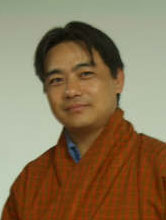
|
<1980年代初頭のブータン英語教育>
(The English education system in Bhutan in the early 1980s)
私が小学校に入ったのは1981年のことでした。その当時から比べると、今の教育システムは変わったかもしれません。当時は、英語の「アルファベット」や単語などをまず数年間かけて勉強した後、3年生からすべての科目を英語で勉強し始めました。今、家族とはゾンカ語で話しますが、オフィスではブータン人同士でも英語とゾンカ語の両方を使って話します。
(I started elementary school in 1981. The education system might have changed since then. When I first started my schooling, I learned only the English alphabet and a few English words for the first few years. Then from third grade, I started to study all subjects in English. I speak in dzongka with my family. But at the office we speak both in English and dzongka.
)
<日本の小学校で「英語」が必須科目になるかも。どう思いますか?>
(English may become a compulsory subject in Japan. What do you think?)
英語を勉強するのに興味がある日本人は多いのだから、早くからはじめるのはいいと思います。
(I think it's a good idea to learn English for the Japanese at an early age, since there are a lot of Japanese who are really interested in learning English.)
|
|
 「青年海外協力隊」の一員としてブータンで暮らした日本人の意見とは?
「青年海外協力隊」の一員としてブータンで暮らした日本人の意見とは?
★ ブータンでJICAの一員として現地に住んでいた石田孝夫さん。図書館司書としての日本での経験を生かし、現地の図書館に貢献しました。そんな石田さんからみたブータンの言語事情とは?
(Mr. Takao Ishida once lived in Bhutan, where he worked for JICA in establishing a library there. What is his opinion?)
|

|
<ブータンの言語事情>
(About communication in Bhutan)
ヒンディ語やネパール語、ベンガル語を話すブータン人は大勢います。ブータンではインド人、ネパール人、ベンガル人なども多く働いているので、そういう人たちと仕事をするにあたって、彼らの言語をマスターしていることは必須です。逆にいうとマスターしていないとコミュニケーションがとりにくく、よって仕事がはかどらないということになってしまうからです。ブータンの人たちにとって、外国語をマスターすることは趣味や息抜きというよりも「必要にせまられて」=「生きるために」やっているという特徴があると思います。
(Many Bhutanese speak Hindi, Nepalese and Bangali, because there are many workers from India, Nepal and Bengal. It is necessary to master these languages so that the Bhutanese can communicate with them. For the Bhutanese, learning foreign languages is not a hobby or a way of killing time. It's a living.)
<なぜ英語が普及しているのでしょうか?>
(Why is English education so advanced in Bhutan? What is your opinion?)
日本のように自国語に翻訳されたものがなく、英語の本を手に取ったほうが手っ取り早いから。現に、英語版とゾンカ語版があるブータン唯一の新聞 "Kuensel"(最近週1回が2回発行になった)も、英語版のほうが中身も多く、大部分の人が英語版を読んでいます。
(The reason could be that there are not many books translated into dzongka. Kuensel, which is the only newspaper in Bhutan, used to be published once a week, but now it's twice a week. There are different versions, and the English version is the most widely read. Not a dzongka.)
<なぜ、80年代に入ってから、「英語で」教育する方針になったのかについて>
近代教育制度を導入するにあたって、自国語では教育ができないと考えたから。自国語はもともとお寺の中でお坊さんが使っていた言葉なので、ボキャブラリーが限定されます。たとえば科学(science)という言葉がなかったりして、教育には不十分と考えたから。
( I think the reason stems from a lack of having enough vocabulary in dzongka. dzongka is originally the language used by monks, and so its vocabulary is not as extensive as English. For instance, there is no word for science in dzongka.)
|
 ブータンに仕事で訪れる国際公務員の意見とは?
ブータンに仕事で訪れる国際公務員の意見とは?
★ワシントンDCに本部をおく 世界銀行に勤務する慶長寿彰さん。ブータンには仕事で何度も訪れています。
(Mr. Toshiaki Keicho works at the World Bank, which is located in Washington DC. He has been to Bhutan many times on business. )

|
<日本の公立の小学校で「英語」が必須科目になるかもしれません。どう思いますか?>
(English may become a compulsory subject at public elementary schools in Japan. What do you think about that?)
英語を始める時期については、特に意見はありません。大事なのは、いつから教えるかではなくて、いかに教えるかではないでしょうか。従来の日本の英語教育を続けていたのでは、小学生から教えたって、英語を駆使して世界で活躍できる日本人はあまり育たないような気がします。
(I don't have any particular views on when children should start learning English. I believe the most important issue isn't when but how you teach them. If you continue to teach children in the same way as before, you can't expect them to become proficient in the language, such that they can use it around the world. )
<英語で教育を受けているブータンの子供について>
(About Bhutanese kids educated in English. )
「英語公用語論」の中味がどういうものか存じませんが、やはり自国語や自国の文化を学んでこそ、外国語や外国文化への興味や理解が深まるのではないかと思います。ブータンについて言えば、民族衣装や伝統建築など頑なに独自の文化を守る一方、積極的に国際語を学ばせています。これは一見矛盾しているようで、実はそうではないのです。自国のアイデンティティーの保護と国際化は両立できるはずですし、その両立を追及するのがグローバル化に対応する国家の理想像なのかもしれません。ブータンで英語を話す子供たちに触れて、そんなことを考えています。
(I don't know a great deal about the Japanese government's eigokogoron (English as the national language) initiative, but I think it's absolutely necessary to master one's mother tongue and culture first. I will help in understanding foreign languages and cultures. As for Bhutan, they have a solid policy of protecting their traditional dress and architecture, while at the same time encouraging children to learn foreign languages. At first glance, it looks like a contradiction. But it isn't as incompatible as you might think. Preserving your own identity while keeping up with the rest of the world could be the best balance. It might be the ideal nation that balances these. Talking with Bhutanese children who speak English made me think of these things.)
| | | | | | |
|
■PART 6
ブータンの教育制度
(Bhutanese Educational System)

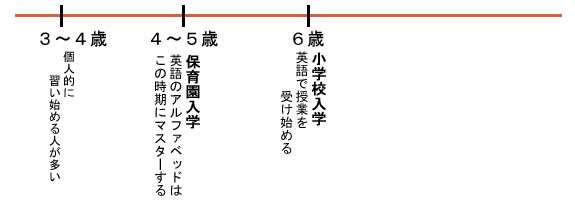
★ブータンには、義務教育はありません。
(There is no compulsory education in Bhutan.)
※ブータンの小学校教育は6歳からですが、4歳から入学する児童もいました。
今はあまり見られない傾向ですが、特別に教育熱心な親御さんだったり、そのお子さんが優秀な場合、6歳になる前に入学することもかつてはありました。
(In Bhutan, children begin studying at the age of six. However, if their parents are eager to have their children start earlier or if the kids are very smart, then they can start going to school before they turn six. )
★ 小学校から(母国語以外は)英語で授業が行われます。
(All subjects are taught in English, except for Dzongka.)
★ 「進級テスト」があります。
※一学年あがるたびに進級テストがあり、落第をする児童もいます。そのため、「大きな(14歳や16歳の)小学生」もいます。飛び級はかつてありましたが、今はありません。
(To move up a grade, students must sit for an exam. Some kids don't make it to the next grade. Sometimes you'll come across a 14 or 16-year-old elementary school student. Kids used to sometimes skip a grade, but not any more.)
★大学以上はインドなど外国の教育を受ける人が多く、国の中枢を担うのは、外国で教育を受けた人が多いです。
(People who want to study in a university tend to go to foreign country, such as India. After returning to Bhutan, they become key personnel in a government or administrative institutions.)
☆★ここでちょこっとブ−タンの一面を見てみましょう。☆★
(Now, let's have a look at Bhutan itself.)
☆☆ 辛いものが大好き☆☆
(We love spicy food!)
料理にはトウガラシが必ずといったよいほど入ります。最も有名な料理は、チーズと赤唐辛子を使った「エマ・ダツィ」と呼ばれるものです。
(Red pepper is often used in Bhutanese cuisine. The most famous dish is called emadatsi. It's a made of cheese and red pepper.)
|
|

|
|
☆☆ 「はい」のときは首を横に傾けます☆☆
(When you want to say, "yes," just shake your head.)
日本では「いいえ」の仕草が、これがブータンでは「はい」の意味になります。
市場での値段交渉の際、気をつけましょう! 相手が首を一回横に傾けたら、「いいえ」の意味ではなく「はい」になります。
(In Japan, shaking your head means "no" in Japan. But in Bhutan, it means "yes." You should keep this in mind, especially when you go shopping and you start haggling with people at the market.)
|
|
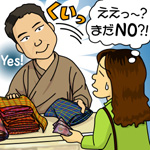
|
|
☆☆子供たちのあこがれ☆☆
(Children's hero/heroin)
ブータンには、テレビが入る前にビデオが入ってきました。そしてその多くはインドからのものでした。今でもインド映画は人気があり、インド人俳優や女優は彼らのあこがれの的です。また、映画でヒンディ語を聞きなれているため、書けないけれど聞き取れるという人も多いです。
(Before having a television, videos were already there in Bhutan. Most of them were from India, in Hindi. Still now, Indian movie is popular among them and Indian actors and actresses are heroes/heroines for kids. By watching such movies, they are getting used to hear Hindi and eventually even mastering it (but not able to write/read).)
|
|

|
|
■PART 7
ブータンの子供の一年間
A typical year for Bhutanese kids.

ブータンは、かつて存在した隣国のシッキムがインドに併合され、チベットが中国に軍事占領された今、世界で唯一のチベット仏教国家となりました。政教一致のブータンでは、さまざまな行事が仏教(チベット密教)と結びついています。
中でも、※「ツェチュ」と呼ばれるお祭りは一年のうちでも大きな国民的イベントの一つです。
(After the annexation of Sikkim by India and Tibet by China, Bhutan became the only remaining Tibetan Buddhist nation in the world. Most of their festivals are linked to the religion - especially the tsechu, which are the biggest festivals on the Bhutanese calendar.)
※ ブータンに仏教を伝えた『パドマ・サンバヴァ』の偉業をたたえるお祭りです。
("Tshechu" are held in honor of Rimpoche Padmasambhava, who brought Buddhism to Bhutan.)
|
|

|
☆★編集後記☆★
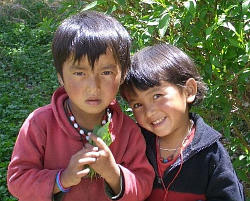 |
Photo by toshiaki KEICHO
|
先進国に住んでいると、物に苦労することは、まずない。
(Living in a developed country, you assume that you have to face less problems that you would in a developing country.
でも、心の中をのぞいてみると、満たされていない人はたくさんいる。たぶん、発展途上国と呼ばれている国の人たちよりも、多いかもしれない。街を歩いてみると、心療内科や心のクリニックと称する看板が増えてきた気がするのは気のせいだろうか。なぜだろう、物質的にはめぐまれているはずなのに。日本を含めた先進国に見られるこの共通の傾向に、いつも疑問を感じていた。
(Whereas there is often a great underlying unhappiness among the people of developed country, many of whom suffer from psychological problems - more so that in developing countries. When I walk down the street, I find it hard not to notice the number of advertisements for mental clinics, and the number just seems to be increasing. This is despite the comparative material comfort in which many of us live. This has always bothered me.)
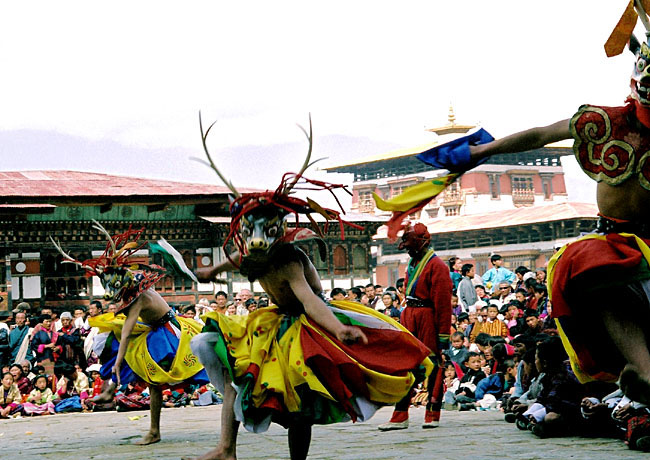 |
| Photo by Taku EGUSA |
そんな、物があふれる中で精神的に行き詰る人の多い先進国を尻目に、独自の路線を行くブータン。最近では"GNP(国民総生産)"より"GNH(国民総幸福)" を国家の方針として取り入れていること、また小学校から「英語で」教育をしている国としても注目されている。なぜそのやり方が取り入れられたのか。それには、いろいろな要素が考えられる。
(Bhutan has always gone its own way. It's never really followed in the footsteps of other nations. It has a unique policy toward protecting its natural environment, as well as having a Growth National Happiness, which is, in theory, more important than Growth Domestic Product.
They are also drawing much attention from around the world as a nation which has adopted the immersion program. Why did they start to doing this? )
*言語(language)
例えば、言語そのもの。もともとサンスクリット語からきているといわれるゾンカ語には、仏教用語はあるものの、「科学」「環境」などの言葉がない。教育の現場では、これらの言葉を容易に表現できる英語を「学びの手段」として取り入れる必要があったということだ。
(Dzongka's origins lie in Sanskrit. Much of it is comprised of Buddhist terminology and it lack vocabulary in other fields such as science or environmental studies. It is easier to speak about these topics in English, which is why English has become a medium of instruction.)
 |
Photo by Kaoru AOKI
|
*国をまとめる言葉として (language as a govern the nation)
ブータンには沢山の地方言語が存在し、全国共通で使えるブータンの言語はなかった。現在国語となっているゾンカ語は、あくまで西の一部で使われていたにすぎない。しかも、そのゾンカ語が国語と定められたのは1980年代。単語やつづりの整備をするためのゾンカ語の開発委員会が設置されたのはそのころだった。そのような紆余曲折の時代、国をまとめて近代教育を進めるにあたっては、やはり英語が手っ取り早い手段であったということ、また同時に不可欠でもあったことがいえる。現在、英語で教育を受けた世代は、たとえゾンカ語で話しているときも、数字は英語で言ったり、ブータン人同士でも英語で話すなどしている。若い世代では、既に英語が日常語化しているのだ。
(Once there were many languages spoken in what is currently known as Bhutan. There was no common language. Dzongka was used only in the western part of Bhutan, and it is only 20 years ago that it became the national language, when a Committee for Dzongka Development was established. At around the same time, English came to be encouraged as an integral part of the educational system, partly because it was a simple way of governing the nation. It is now widely spoken among young people. Even when they speak Dzonghka, they often mix English words into their conversation - for example, for numbers. )
*農作業と英語!?(Agritulture and English!?)
ブータンは自給自足の国だ。その国民の実に70%は農業に関わっている。だが、農作業に必要な機械(輸入品)の説明書は、ほとんどが英語で書かれている。英語がわかれば、機械の操作方法もわかる。よって、生活に必要な機能的な言葉として、英語で教育を受けなかった親世代もその必要性を感じ、子供を学校に行かせることに積極的になっているともいわれている。
(Seventy percent of the population is involved in agriculture and are self-sufficient. Machines, however, are imported from foreign countries and the manuals are in English. Knowing English obviously helps in operating these machines, and people who could not speak English realized how necessary it was and have encouraged their children to study it at school.)
*隣国インドの影響 (Influence of India)
近代教育制度がはじまったのは先代の国王のころ、そして自国の教育制度が確立されはじめたのは1968年代からだといわれている。それまでは、ブータンは隣国インドの教科書を用いたり、教員の補充もインドから招いたりしていた。そしてそのインド人の共通言語である「英語」の影響を受けたのは言うまでもないだろう。
(It is said that the modern education system began with the third king of Bhutan around 1968. Until then, the Bhutanese used Indian textbooks and invited teachers from India.Needles to say, they are influenced by Indian's common language, English. )
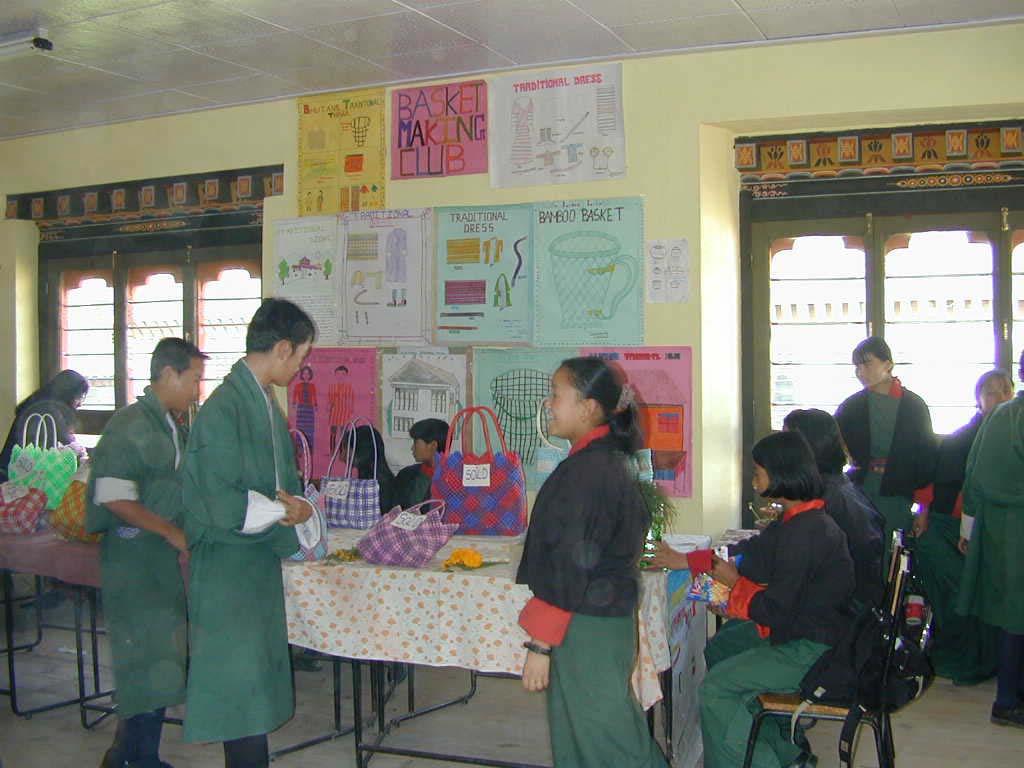 |
Photo by Kaoru AOKI
|
*歴史的背景 (Historical background)
1970年代になるとブータン南部には多くのネパールからの移民が住み着き始めていた。そのころ隣国であった同じチベット仏教国家の小国、シッキムにもネパールからの移民が押し寄せ、その人口の過半数はネパール人と化したといわれている。その後、この小国シッキムはインドに併合され、チベット仏教国家がひとつ消滅した。同年、1975年に中国がチベットに軍事介入して以来、この世界からチベット仏教国家がまたひとつ消滅していったことになる。
(In 1970, many people emigrated from Nepal to the southern part of Bhutan. At the time, the nation of Sikkim also received a number of people from Nepal. It is said that half the population of Sikkim is Nepalese. The country eventually lost its power and its identity after it was annexed by India in 1975. In the same year, Tibet was occupied by China. Two Tibetan Buddhist nations disappeared in the space of one year. )
結果的に、チベット仏教国家と呼ばれるのは、残されたブータン王国のみとなった。このような時代背景の中、若き現国王は1988年に国勢調査を行う。そして、国内の事情を把握した翌年の1989年、国家統合政策を発表し、施行。民族衣装の着用義務を掲げたのものその一つだ。また、その中には言語政策もあった。ゾンカ語を国語に定め、南部の学校内でネパール語を使用することは禁止し、同時に国をまとめるためにも英語を教育言語とした(英語での授業は1980年代半ばから始まった。また、国王自身イギリス留学の経験があり、ブータンの英語の教科書にもイギリス人が多く寄与している)。
(Bhutan is the only country where Tibetan Buddhism is practiced on a nationwide basis. In 1988, the king decided to hold a national census. He encouraged the maintaining of a strong Bhutanese identity, part of which involved making the people were traditional dress. Dzongka became the national language, and Nepalese was prohibited in the south. And so English became the language of education in the mid-1980s. This king himself had studies in Britain and many British people are involved in making English textbooks in Bhutan.)
ブータンの小学校で「英語」を使って授業をする背景には、一言では語れないこのようなさまざまな事情があると思われる。
(Already, we've covered many reasons how and why English came to be the medium of instruction in Bhutan. )
現在、ブータンでは「教育と医療は無料に」をスローガンに改革を進めている。国王は2015年までにすべての国民が教育を受けることを望んでいる。国土には山岳地帯が多く、学校までたどり着くのに 2時間もかかる道のりを歩く子供も少なくない。そのため、出席日数が足りずに落第したり、進級できずに落ちこぼれていく子供たちもいる。そうなると、英語での教育どころではなく、このような問題を解決するためにも国は「寮」を建設したりして、教育面に力を入れている。今回PART5 に登場してくれたウゲンさんも、物心ついてからというもの教育は寮に入って受けていたと語ってくれた。小さいころから寮に入って学ぶ子供たちは多い(全寮制のため、家族が恋しくなって、ある夜、寮を抜け出す話がテーマとなる英語の教科書もあるほどだ)。
(The nation's slogan is "free education and medical services." Reforms are taking place. The king hopes that all children will be able to have access to educational facilities by 2015. There are many children who have to walk for more than two hours to get to schools in the mountains. It's not easy. Because of the difficulties of getting there, their grades are dropping. There are dormitories for those who live in remote areas. Mr. Ugyen (see Part 5) spent his entire school life living in a dormitory. (Incidentally, in one of the English textbooks, there is the story of a homesick boy who lived in a dormitory. He missed his family so much that he made his way home.)
われわれ日本人のように「英語を小学校で必須科目にするかどうするか」で議論をするまでもなく、ブータンでは「せざるを得ない状況」があったのは注目に値するだろう。結果的に、このグローバル化した世界の中、ブータンの人たちは、伝統文化を守りながら、つまりアイデンティティーを保ちながら「英語」という道具を身につけている。GNHを国家スローガンとして掲げ、家族の持つ価値の重要性や老人が尊敬される世界を作り、伝統をきちんと伝える教育を行い、その一方で、英語の普及による母国語の危機に悩み、そのバランスを保つという難事業に取り組む——この小国ブータンからは、英語教育のみならず、学ぶべき点、考えさせられる点が多々あると思われる。
(In Japan, the great questions is: should English be a compulsory subject at elementary schools. In Bhutan, they have no choice. And look at the difference. The Bhutanese are acquiring English quickly and efficiently in this age of globalization. At the same time, they are keeping their identity and traditional culture. The nation places importance on happiness and respect for the elderly. There is much that Japan can learn from this country.)
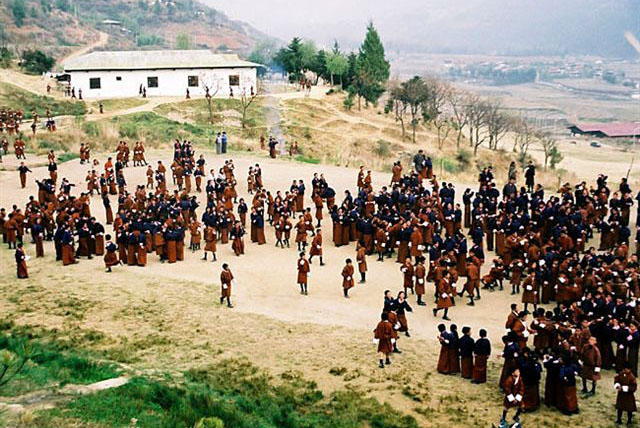
|
Photo by Taku EGUSA
|
最後に、GNHについて(About GNH)
GNHは主に3つの要素——1.経済的な豊かさ 2.環境保護 3.伝統文化の維持・発展——からなる、といわれている。要は、環境や文化・家族・地域共同体のきずなまで犠牲にするような経済成長は、人々を幸福にしないということだ。ブータンを特集することにより、取材を進めた中で「ブータンで驚いたことの一つは『物乞い』がいないことです」というコメントがあった。1990年代初頭、ブータンでJICAの一員として当地で過ごされた石田先生のコメントだ。もちろん、身寄りのない人も貧しい人もいるのだが、地域共同体がしっかりしており、 助け合いの文化が根付いているため、いわゆるホームレスや物乞いは生まれないのだそうだ。
逆に日本に来日するブータン人が驚くことの一つに、都会の駅などで見られるホームレスの存在だといわれている。
(Gross National Happiness seems to comprise of three factors: (a) economic wealth, (b) protection of the environment, and (c) maintaining and developing its traditional culture. In short, economic growth that sacrifices environment, culture, and family does not make us happy.
There was one comment from Mr. Ishida (see Part 5) that particularly surprised me. He said there are no homeless people in Bhutan. That said, there are people who are poor and people who live alone, but the community seems to take the trouble to support the. "It's there culture," he said. "They do not ignore people who are in trouble. On the contrary, one of the most shocking things for a Bhutanese person coming to Japan is the number of homeless people."
acrifices environment, culture, and family does not make us happy.)
また、2.の環境保護については、科目として学校教育の中で取り入れたり、実際自分の住む地域の川を水質汚染検査をさせたりするなど、より身近な問題として教師が指導にあたっている(この環境保護の科目は1985年から始まっている。伝統を大切にしながらも既に先見の明を持っているのは国民性だろうか)。3.の伝統文化については、ブータンでは新築の建物にしろ、伝統様式に則ったものでなければならないという決まりがある。この伝統様式の建物についての図解が、なんと英語の教科書で載っており、ブータン人は英語の教科書で自分たちの伝統的な建物とは何かということを学ぶのである。英語教育はもとより、伝統とは?心の豊かさとは?などについて考えさせられた取材だった。
(Environment Protection is one of the most important subjects at elementary school. It was introduced into the curriculum in 1985, which shows a remarkable far-sightedness on the part of the Bhutanese government.
As for keeping and developing their own traditional culture, there is a rule that all architecture must be built in a traditional way. This is explained in the English textbooks, whereby children learn not only English but about tradition as well.
Kids' English around the world is the theme of this site, yet after looking at Bhutan, there are some key questions that stick in my mind: what is tradition, what is wealth, and what is happiness? )
|
|
|
|
|
|






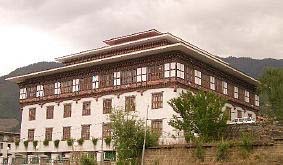
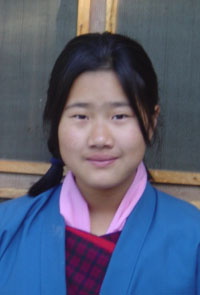









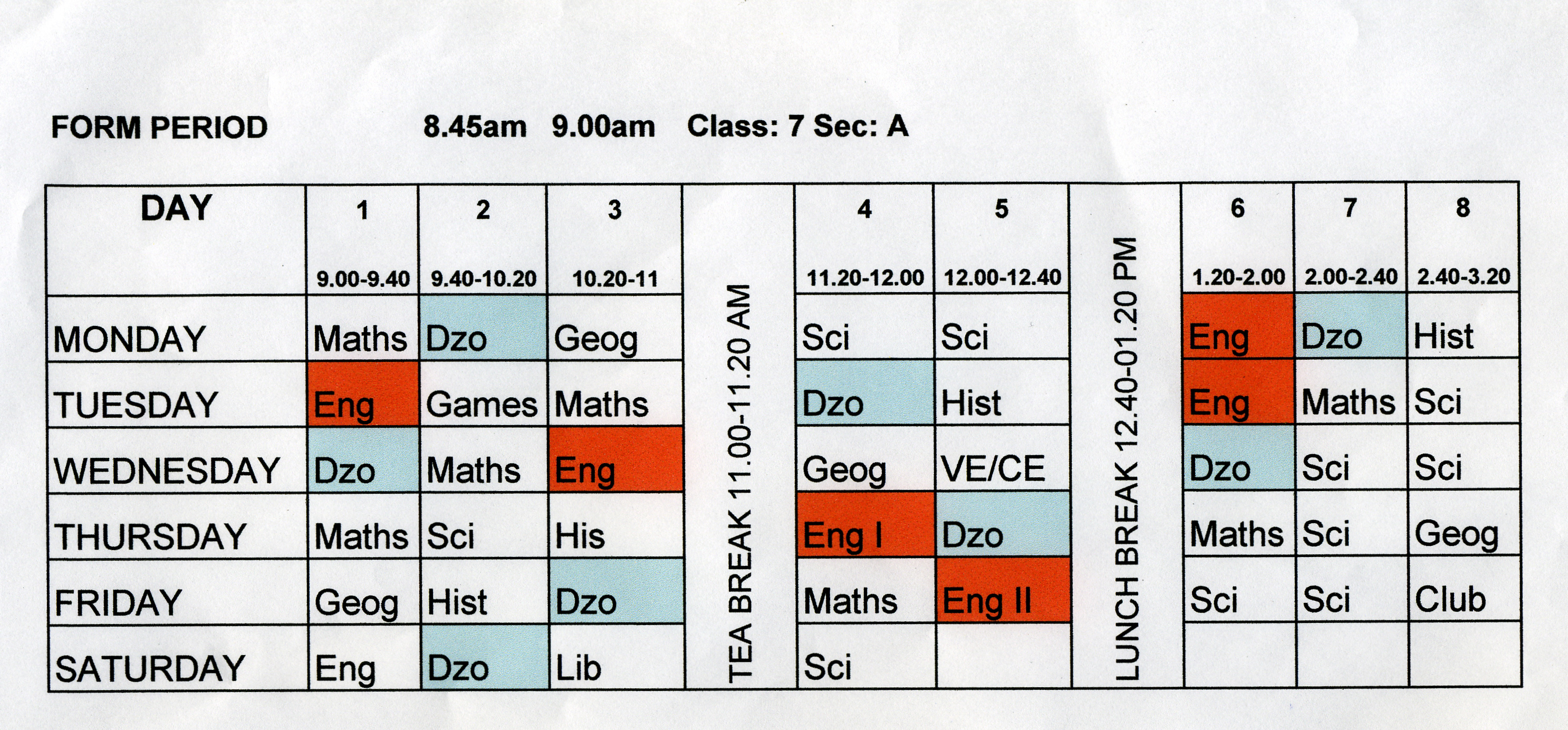
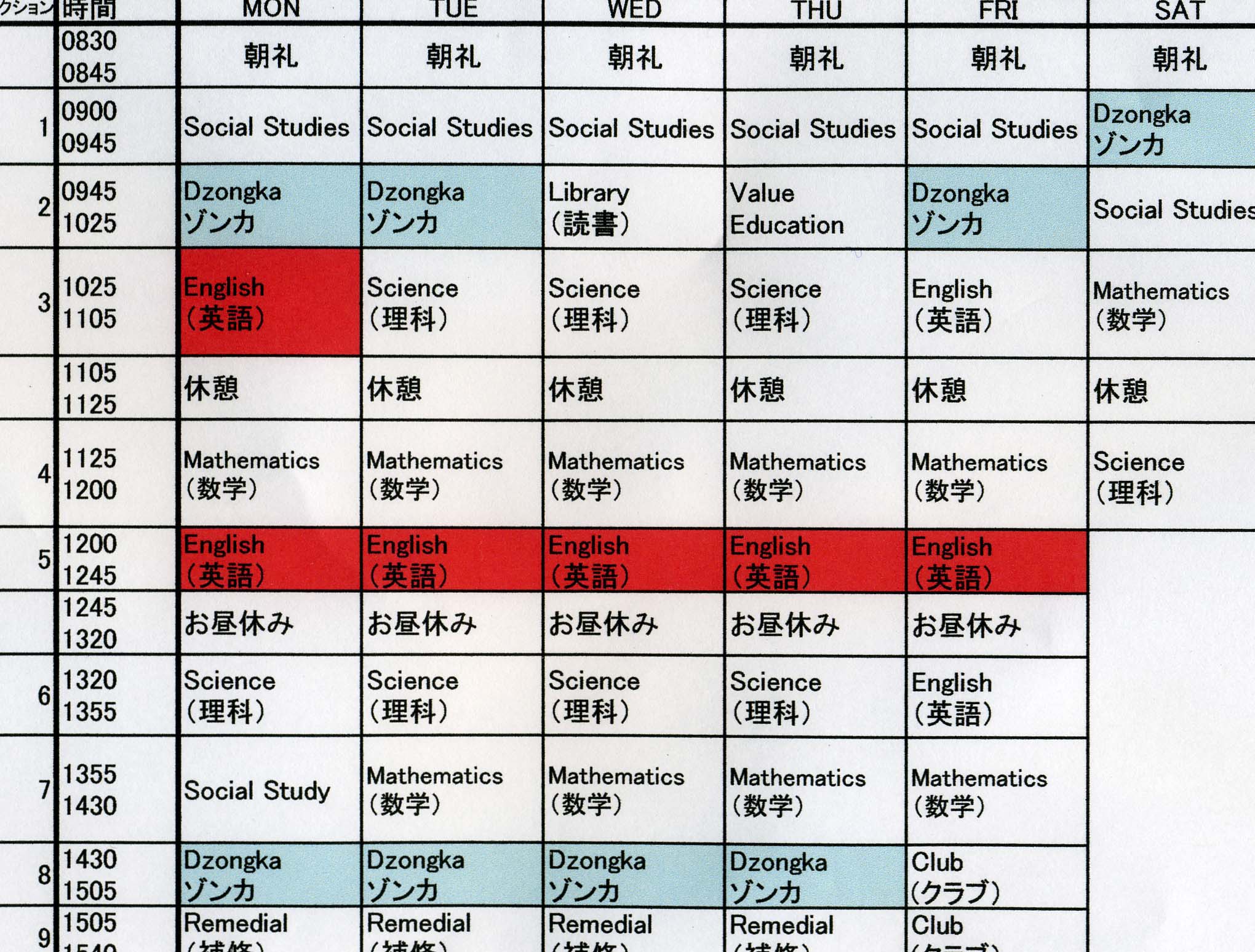
 (教科書のカバー)
(教科書のカバー)

 (ある晩、こっそり抜け出します。 )
(ある晩、こっそり抜け出します。 )
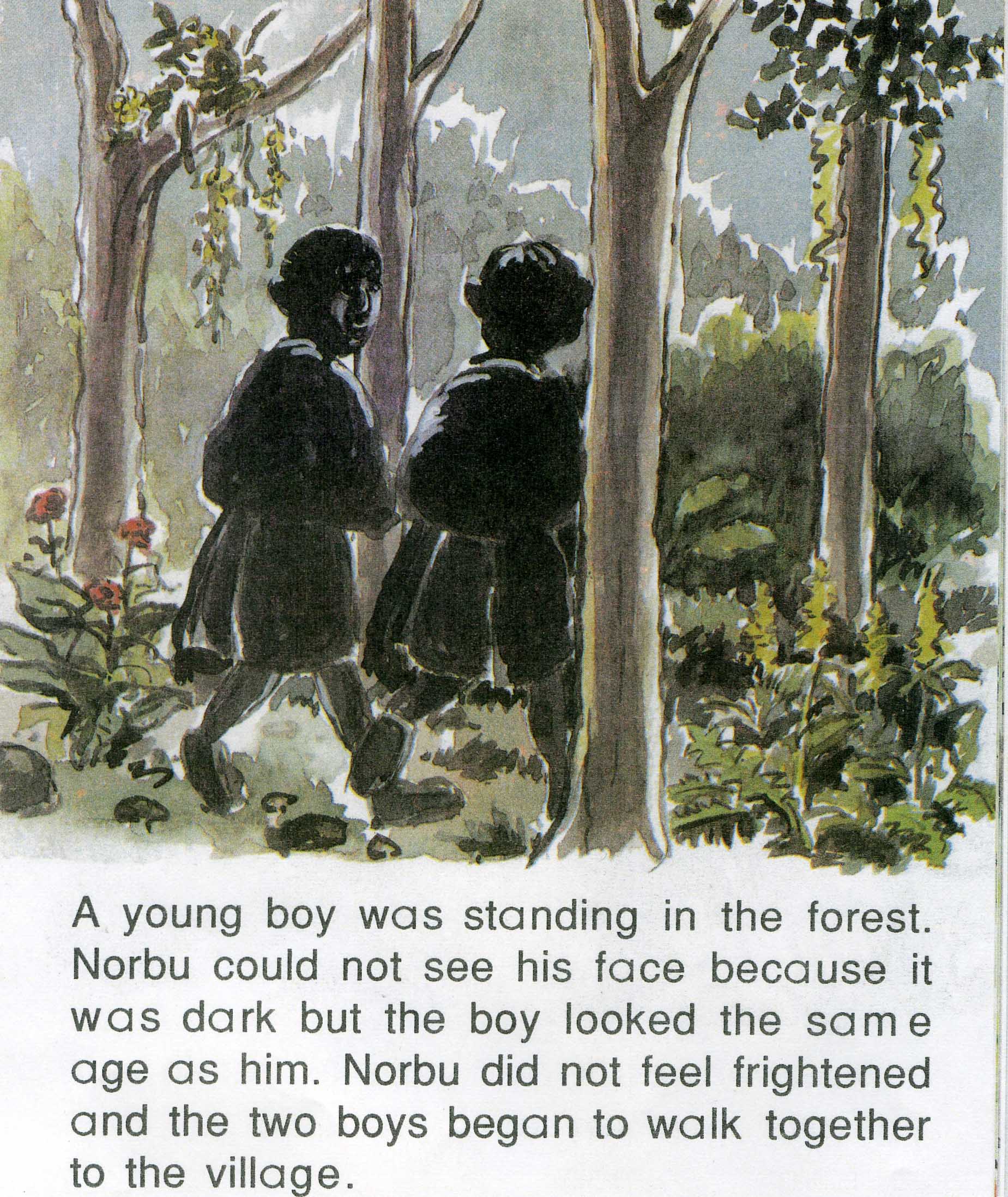 (そこで、一人の男の子と出会います。)
(そこで、一人の男の子と出会います。)
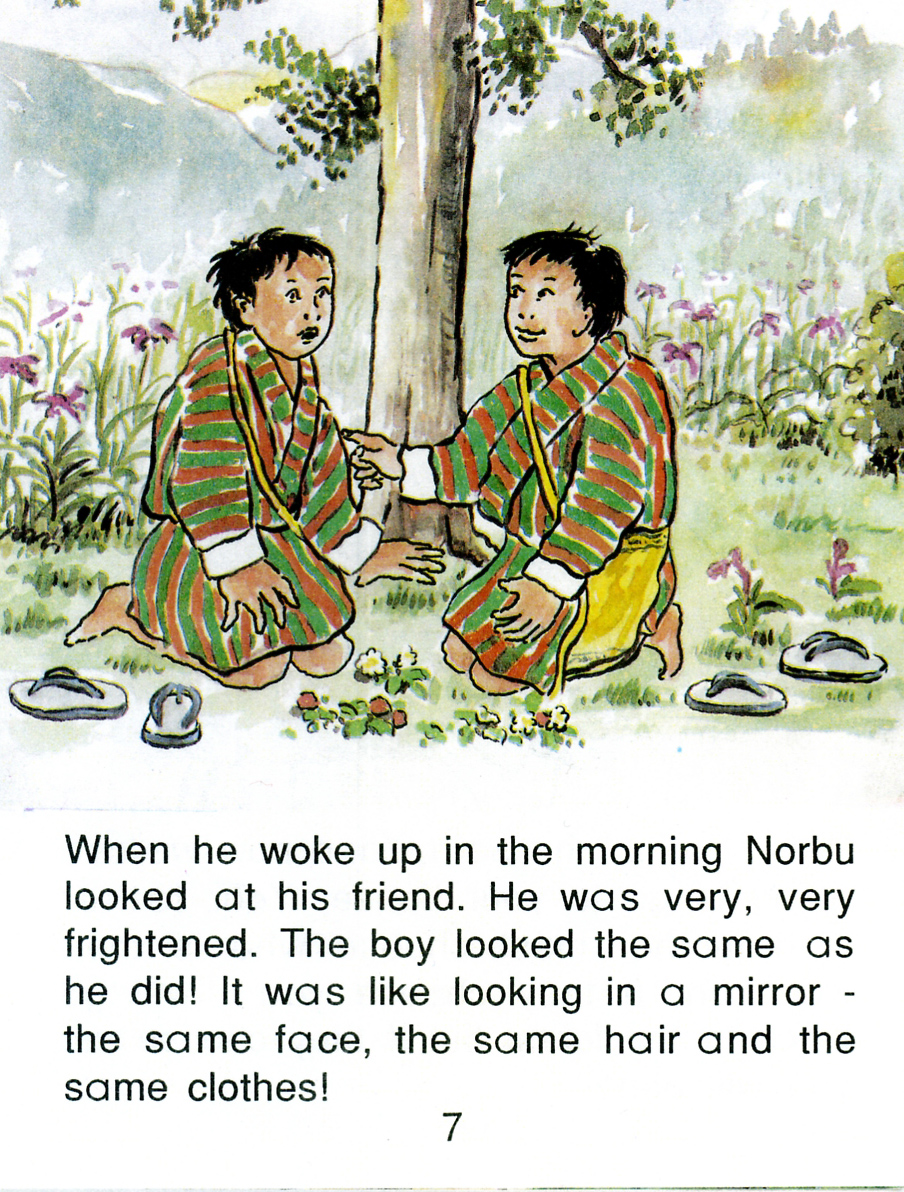 (起きてみたらあらびっくり。相手は自分にそっくりでした。)
(起きてみたらあらびっくり。相手は自分にそっくりでした。)
